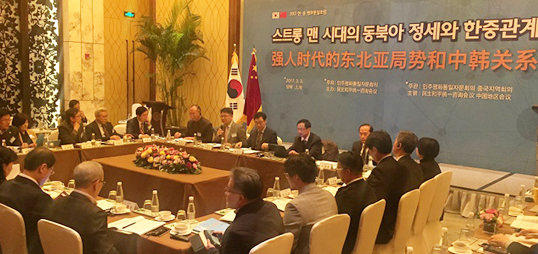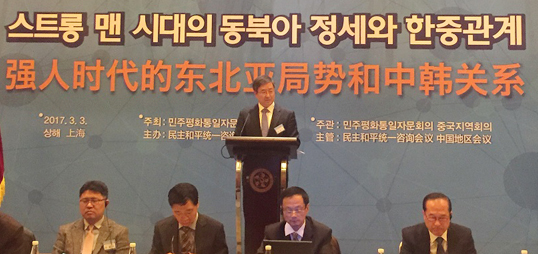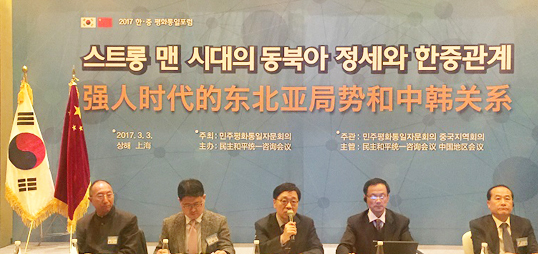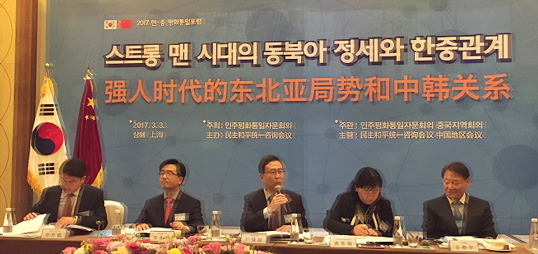| 中国上海で 「韓中平和統一フォーラム」開催 |
|---|
| 世論分析課, 2017-03-06 |
“Korea-China Peaceful Unification Forum” Held in Shanghai, China
Discussion of Resolution of North Korean Nuclear Issue and Direction of Korea-China Relations Based on Incoming US Administration
NUAC, a presidential advisory body, held the Korea-China Peaceful Unification Forum on March 3 at Renaissance Hotel in Shanghai, China with the attendance of experts from both Korea and China.

View of the Meeting Venue
Hosted by the NUAC China Assembly (vice-chairperson: Lee Chang-ho), this forum was held under the topic “Conditions in Northeast Asia and Korea-China Relations in an Era of the Strong Man,” with Session 1 themed “US-China Relations and Korean Peninsula after the Entry of the Trump Administration” and Session 2 on “Resolution of North Korean Nuclear Issue and Korea-China Cooperation after the Entry of the Trump Administration.” An overall discussion followed. Han Seok-hui, Consul General of the Republic of Korea in Shanghai, gave a congratulatory address, with Nam Goong-young, Professor of Political Science at Hanguk University of Foreign Studies, and Park Jong-chul, Senior Research Fellow at the Korea Institute for National Unification, chairing Sessions 1 and 2, respectively.
“I hope that today’s forum serves as an opportunity for experts from both countries to exchange opinions on the direction of Korea-China cooperation and North Korean policy for the peaceful unification of Korea and to think about our roles in the looming era of unification,” said Lee Chang-ho, Vice-chairperson of the NUAC China Assembly, in his opening address.
Consul General of the Republic of Korea in Shanghai Han Seok-hui introduced a report by Jeffery A. Bader of the Brookings Institution emphasizing the role of China in resolving the North Korean nuclear issue, and said, “The issue of the Korean Peninsula can only begin sincerely after a common perception on unification is in place between Korea and China.”
In his keynote presentation, Secretary General Kwon Tae-oh expressed concerns about China’s current response to THAAD. “In order to maintain the momentum of continuous economic development sought by Korea and China amid the impending American protectionism and neo-isolationism, the two countries will have to cooperate in a bigger frame,” he stressed.
According to him, even though today’s situation caused by North Korea is harming the interests of countries surrounding North Korea, if they keep considering only their own interests and continue conflict instead of working together to stop North Korea and improve the situation, stability and peace in Northeast Asia will be difficult to guarantee.

Keynote Presentation by Secretary General Kwon Tae-oh
In Session 1, which was chaired by Nam Goong-young, Professor of Political Science at Hanguk University of Foreign Studies, Park Byung-kwang, Director of Northeast Asian Studies at the Institute of National Security Strategy, explained that, in the era of the strong man where the leaders of the US, China, Japan, and Russia are all advocating forceful diplomacy and security policies, there is a need to seize preemptive initiative on the North Korean nuclear issue through quick action before the US-China relations are reestablished and the North Korean policy on the Trump administration is finalized.
According to Park Byung-kwang, Director of Northeast Asian Studies, considering the fact that the opposition of China’s strong man Xi Jinping to THAAD is serving as a huge limitation for the Chinese government to act flexibly on the THAAD issue, “face-saving” for Xi Jinping would be an essential element in improving Korea-China relations, which are currently in a crisis due to the THAAD issue.

Session 1
Liu Ming, Professor at the Institute of International Studies of the Shanghai Academy of Social Sciences, emphasized that, since North Korea would not give up its nuclear weapons easily because they are a core card and a strategic guarantee for an equal face-off with the US, North Korea is least likely to relinquish its nuclear weapons only through China’s economic pressure or advice.
Citing the need for a conversation between the US and North Korea in order to resolve the nuclear issue, Professor Liu Ming stressed that we must veer away from the simple reasoning that China should pressure North Korea through economic means, and that we must manage the situation through a holistic approach beyond economic pressure.
Chief Director Hur Sung-woo of the Institute of National Planning and Design noted that the ROK-US alliance will only become stronger as China’s retaliation against THAAD strengthens, explaining that China must seek a way to minimize the risk of the Korean Peninsula in Northeast Asia instead of keeping the US in check using Korea as a lever. He suggested that the US and China declare the resolution of the North Korean nuclear issue a “Common Security Interest” and establish a new Korea-US-China alliance for the execution of such.
According to Guo Dingping, Professor of Political Science at Fudan University, there is a need to focus not only on the uncertain elements of Northeast Asia but also on the stable elements such as interaction between citizens of Northeast Asian countries as well as public opinion. He proposed that excessive emphasis on uncertainty be substituted with a discussion of actual interests, such as the interest of citizens and countries, peaceful stability in the region, and cultural exchange and cooperation, and that mutual progress be promoted.
In Session 2, which was chaired by Park Jong-chul, Senior Researcher at the Korea Institute for National Unification, Researcher Lee Seung-yeol of the National Assembly Research Service said that forceful sanction and conversation must proceed simultaneously to resolve the North Korean nuclear issue and emphasized the role of China in this process.
“When China listens more carefully to the demands of the international community and enforces stronger international sanctions with the goal of denuclearization of North Korea, we will be able to lead North Korea to the table of conversation,” Research Lee Seung-yeol said. He also emphasized that now is not the time for Korea and China to fight over the deployment of THAAD but to foresee the future and cooperate in order to prevent a tremendous disaster that can affect Northeast Asia once the latter completes its nuclear weaponry and ballistic missile system.

Session 2
Gong Ke-yu, Vice-chief of the Center for Asia-Pacific Studies at the Shanghai Institute for International Studies, mentioned peaceful resolution through conversation, denuclearization of North Korea through sanctions, and destruction of North Korean nuclear facilities through force as efforts that can be made by the international community to resolve the North Korean nuclear issue and proposed resolution through conversation as the optimal choice. Vice-chief Gong Ke-yu also emphasized the need for the US to move more proactively in order to resolve the North Korean nuclear issue. “The 3 countries of Korea, China, and the US must actively cooperate with patience, progressing through fair negotiation and flexible spirit of operational cooperation,” he added.
Kim Tae-woo, Professor of Military Studies at Konyang University, pointed out that, regarding the THAAD issue causing acute conflict between Kore and China, it is reasonable for China, without its national survival at stake, to consider the position of Korea, which is seeking defense against threats to national survival. He stressed that the THAAD issue must be discussed together with the North Korean nuclear weapons, providing the cause and justification for its deployment at its core, and that it must be fundamentally coordinated through US-China cooperation on the North Korean nuclear issue.
According to Researcher Li Kai-seng of the Shanghai Academy of Social Sciences, the Trump administration must complete its review of North Korean policy as soon as possible and return to the agenda of resolving the North Korean nuclear issue for the ultimate resolution of the issue. He stressed the need for Korea to form a hospitable environment that can prevent the deterioration of China-US and China-Korea relations due to THAAD.